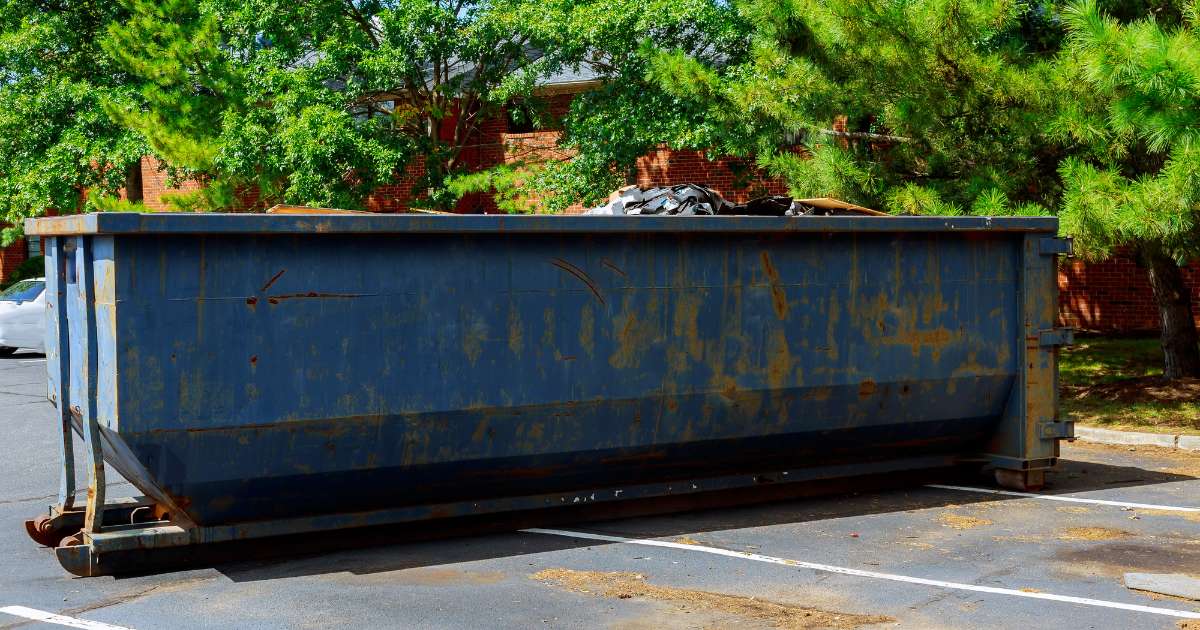Understanding what can go in a dumpster rental is crucial before you finalize your booking. While most waste materials are generally accepted, there are certain items that aren’t permitted.
So, what exactly can you toss into a dumpster? The answer is straightforward, but there are some important exceptions to keep in mind. Many of these exceptions are determined by state regulations, so it’s essential to be informed before you start filling up the dumpster.
The last thing you want is to face penalty fees or, even worse, discover that your waste cannot be legally disposed of at a landfill by our drivers. Take a look at the lists below to see what materials are allowed, prohibited, and sometimes allowed.
What You CAN Throw Away: Your Guide to Dumpster-Friendly Items
If you’re asking yourself, “What can I put in a dumpster?” you’ve come to the right place! Most items that don’t endanger the dumpster or harm the environment can be safely disposed of. To help you navigate, here’s a comprehensive list of what you can confidently throw into a dumpster rental:
Household Trash
Common household garbage is usually a safe bet for dumpster disposal, but make sure to check what permits are required in your area. This includes non-hazardous materials like broken furniture, everyday trash, and some smaller appliances.
Items like worn-out rugs, old toys, and even those boxes of junk you’ve been meaning to clear out are good to go. Outdoor trash, such as old shingles, siding, and other leftover building materials, also qualifies as safe household garbage.
Just be sure the materials aren’t contaminated with hazardous substances like asbestos or lead paint.
Wooden Furniture
Wooden furniture is almost always safe to throw away in a dumpster. Think about those old chairs, tables, coffee tables, bed frames, and shelves that are taking up space.
As long as the furniture is made purely from untreated wood, it’s accepted at most landfills. However, if your wooden furniture has been treated with chemicals, paint, or varnish, it’s best to check local disposal regulations, as some landfills may have restrictions on treated wood.
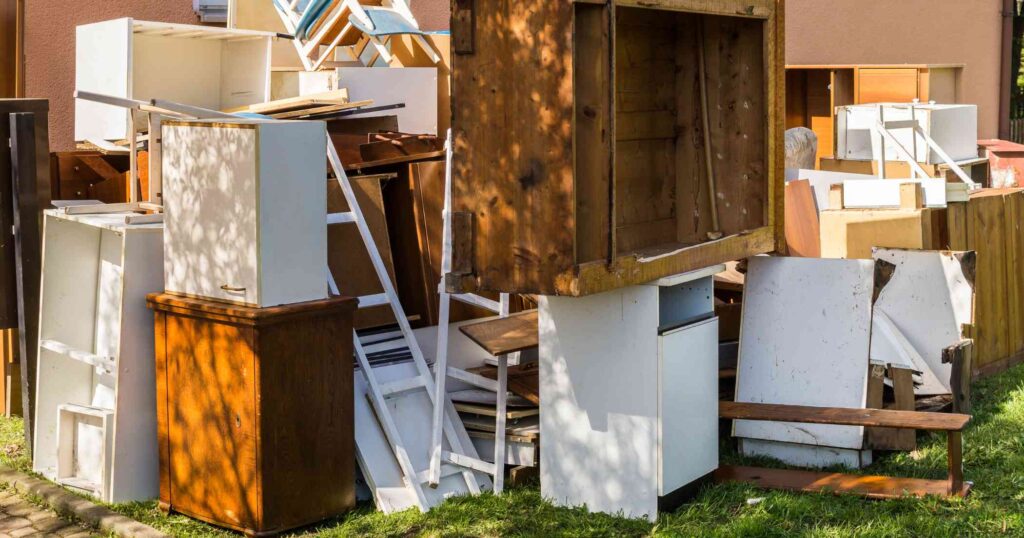
Household Appliances
Smaller household appliances like microwaves, blenders, coffee makers, and toasters are typically allowed in a dumpster. These items are convenient to dispose of when you’re cleaning out your kitchen or upgrading your appliances.
However, when it comes to larger appliances, like refrigerators, air conditioners, and washing machines, there are often stricter regulations.
These larger items might contain refrigerants, oils, or other substances that require special handling. Be sure to remove these substances, if applicable, and check with your dumpster rental provider about specific rules.
Yard Waste
Yard waste is usually accepted in dumpsters, making it easier to handle seasonal cleanups. If you’re unsure, learn more about disposing of sod in a dumpster. Leaves, branches, twigs, grass clippings, and even small tree stumps can all be tossed into a dumpster.
Just remember, organic waste is non-hazardous, so it’s safe to dispose of even in larger quantities. However, if you’re dealing with massive amounts of yard waste, like after a major landscaping project, you might want to consider if a separate yard waste container is more appropriate to avoid overloading your rental dumpster.
Dirt
Disposing of dirt is generally allowed, but there are a few considerations. If you’ve got a pile of clean, uncontaminated dirt, you can usually toss it into the dumpster without issue.
However, contaminated soil—such as dirt that has been exposed to chemicals, pesticides, or hazardous waste—cannot be thrown away in a regular dumpster.
For this type of material, you’ll need to seek out a special disposal service. Additionally, some areas offer recycling programs where clean soil can be repurposed instead of dumped, which is a more environmentally friendly option.
Electronics
While many electronics are recyclable, if you have small electronic devices that can no longer be recycled, they can be placed in the dumpster.
Items like old computers, printers, mobile phones, and small home electronics fall into this category. However, you should only do this if recycling isn’t an option, as recycling e-waste is highly encouraged.
If you have a larger quantity of electronics, or items like televisions and computer monitors, you should look into specific e-waste disposal regulations.
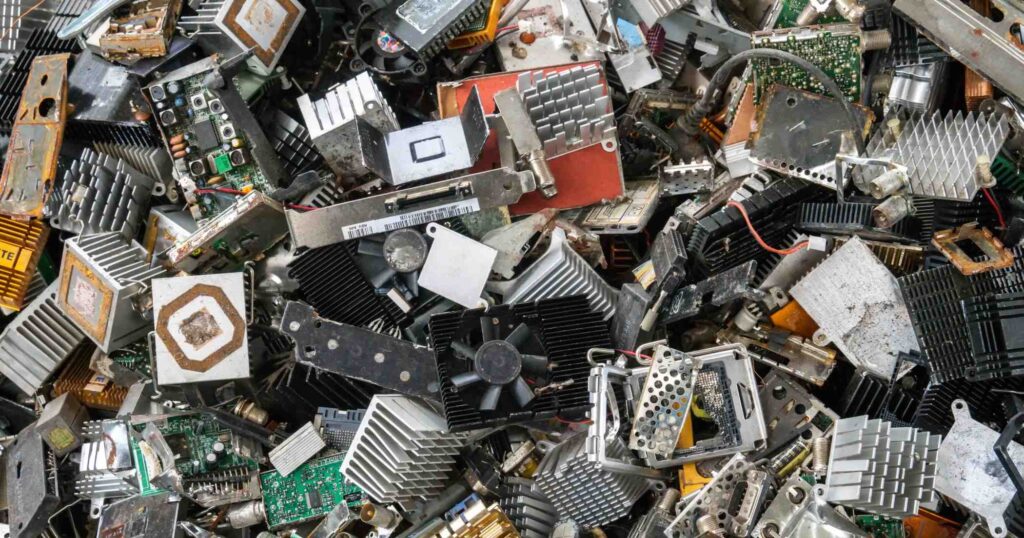
Alkaline Batteries
Thanks to advancements in manufacturing, alkaline batteries are now landfill-safe, meaning they can be thrown away in your dumpster rental.
These are your standard household batteries—like AA, AAA, C, D, and 9-volt—that you might find powering remotes, flashlights, and other small devices.
Since they no longer contain mercury, they don’t pose a threat to the environment when disposed of with other waste. However, if you have a large quantity of batteries, you might still want to consider recycling them to keep them out of landfills.
Empty Aerosol Cans
Aerosol cans are safe to throw away as long as they are completely empty. This includes cans of hairspray, cooking spray, air freshener, and other household products.
Even the smallest amount of leftover product can cause an explosion if the can is punctured or crushed, which is why partially full cans are not accepted.
If you’re unsure whether a can is completely empty, it’s better to treat it as hazardous waste and dispose of it through a specialized program.
Demolition Debris
If you’re tackling a home renovation project, you’ll be pleased to know that most demolition debris can be thrown into a dumpster. This includes materials like drywall, plywood, bricks, concrete, stones, and tiles.
These materials are typically accepted, but keep in mind that they can be heavy. Exceeding the weight limit of your dumpster can lead to additional fees, so it’s important to be mindful of how much heavy debris you’re disposing of.
If you’re dealing with an especially large quantity of heavy materials, you might need a larger dumpster or multiple pickups. By knowing what you can and can’t throw away, you’ll avoid any surprises and ensure a smooth, hassle-free dumpster rental experience.
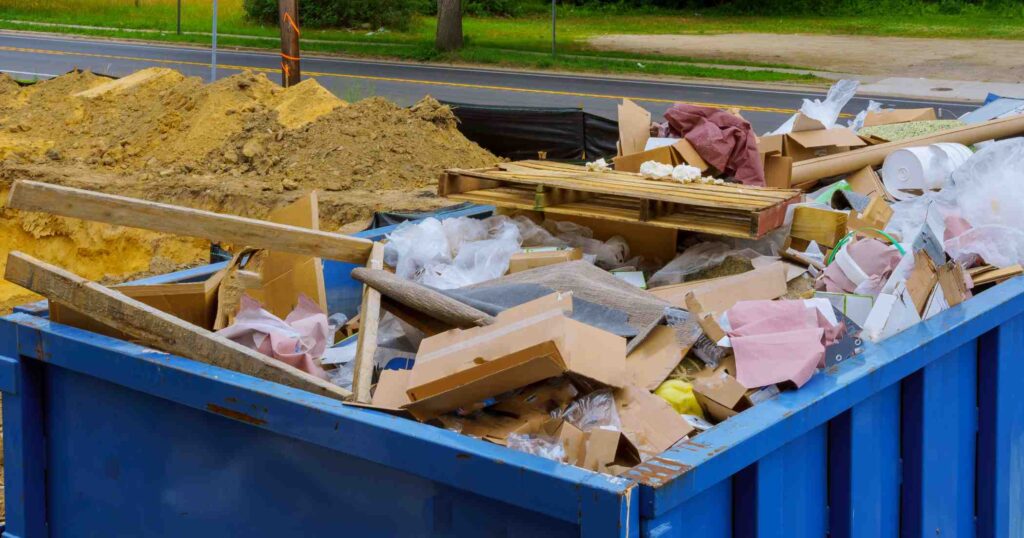
What You CAN’T Throw Away: Avoid These Items in Your Dumpster Rental?
While dumpster rentals are incredibly versatile, there are some strict limitations on what you can toss inside.
These restrictions help protect both the environment and the integrity of the dumpsters. Here’s a detailed look at what you should avoid throwing away:
Refrigerators and Air Conditioners
Refrigerators and air conditioners might seem like they belong in a dumpster, but they contain a harmful refrigerant called Freon. Freon is toxic and must be completely drained before these appliances can be safely disposed of.
This process usually requires the expertise of a professional, so it’s not something you should attempt on your own. Even newer refrigerants like Puron, found in modern air conditioning units, are also harmful if released into the environment. Because of this, tossing these items into a dumpster is a big no-no.
Tires
Tires are not only illegal to dump in landfills, but they also pose a unique environmental hazard. The hollow center of tires can trap methane gas, which can lead to dangerous situations in landfills.
Instead of tossing tires into a dumpster, take them to an auto shop or a recycling center that accepts them. Proper recycling ensures that tires are repurposed safely, often used in playgrounds, athletic tracks, or as fuel.
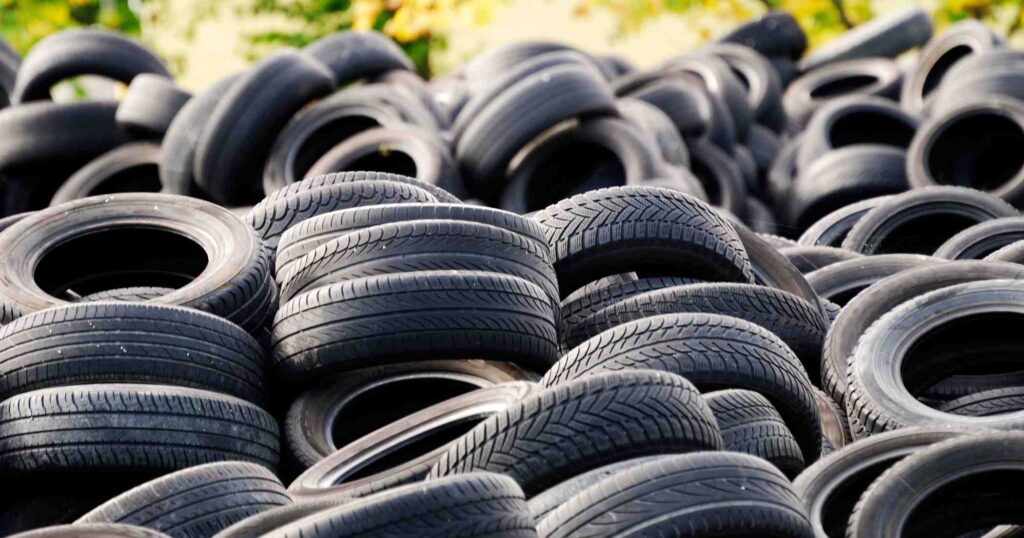
Paint and Lacquers
Wet paint and lacquers are not safe for dumpster disposal due to their toxic properties. If you have leftover paint, you’ll need to let it dry completely before disposal.
Empty paint cans with dry remnants are generally acceptable, but only if all liquid product has dried out. If you need to speed up the drying process, you can mix latex paint with absorbent materials like cat litter or sawdust, making it safe for disposal once fully dried.
For more detailed instructions, check out our guide on how to dispose of paint in the DFW area.
Adhesives
Adhesives like glue, tape, and other sticky substances are prohibited from dumpsters. These materials can cause significant problems if they rupture or leak inside the dumpster.
If adhesives spill, they can cause other waste items to stick to the dumpster’s walls, leading to a sticky, difficult-to-clean mess. It’s best to look for alternative disposal methods, such as specialized recycling programs, to avoid these issues.
Non-Alkaline Batteries
Batteries that are not alkaline, including lithium batteries, car batteries, and large battery packs used in boats or RVs, should never be thrown into a dumpster. These batteries can emit toxic fumes or leak dangerous chemicals when exposed to the pressures of a landfill. Learn more about the hidden fees in dumpster rentals that could arise from improper disposal.
If you have these types of batteries, it’s important to recycle them properly. Many communities offer battery recycling programs to ensure they are disposed of safely and responsibly.
Hazardous Materials
Before you toss anything into a dumpster, check for hazard symbols on the packaging. Items marked as hazardous are not safe for dumpster disposal and can cause serious environmental harm if not handled properly. For more details, see disposing hazardous materials via dumpster.
These materials may include chemicals, solvents, pesticides, and certain cleaning agents. Always refer to the product’s packaging for proper disposal instructions, or explore recycling options that can safely manage hazardous waste.
Medical Infectious Waste
Medical waste, including syringes, needles, and any materials contaminated with blood or bodily fluids, are strictly prohibited in dumpsters.
These items pose a significant risk to public health and must be disposed of through specialized medical waste disposal services. If you’re unsure of how to dispose of medical waste, consult Texas state resources for guidelines on safe disposal methods.
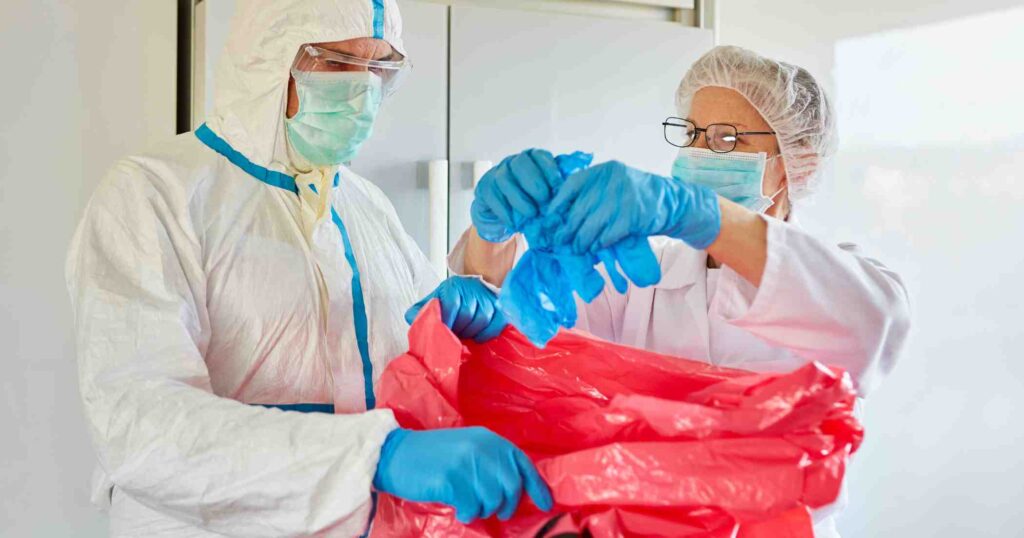
Hot Water Tanks
Hot water tanks, similar to aerosol cans, have the potential to explode when compressed in landfills. The tanks can accumulate gases that make them highly dangerous, so they should never be thrown into a dumpster. Instead, consider contacting a professional service that specializes in the safe removal and disposal of hot water tanks.
Inks and Resins
Inks and resins, such as those found in printer cartridges or certain craft supplies, should not be thrown into a dumpster. These substances can easily leak, causing contamination and potentially damaging other waste materials.
To dispose of inks and resins properly, look for recycling programs specifically designed to handle these materials, which can often be found at office supply stores or through community recycling events.
Oils and Fuels
Oils, fuels, and other flammable liquids are hazardous and must be kept out of dumpsters. These substances pose a significant fire risk and can contaminate the environment if not disposed of properly. Many communities have designated drop-off locations for oils and fuels where they can be handled safely.
Asbestos
Asbestos is a highly dangerous material that requires professional removal. If you suspect that your household waste or construction debris contains asbestos, do not attempt to dispose of it in a dumpster.
Asbestos contamination is a serious issue that can lead to health problems and environmental damage. Always hire a licensed professional to remove and dispose of asbestos safely.
Household Cleaning Fluids
Many household cleaning products contain chemicals that are harmful to the environment and should not be thrown into a dumpster. Before disposing of any cleaning fluids, check the label for disposal instructions.
Some cleaning products can be safely diluted and washed down the drain, but others might need extra care. If you’re unsure about how to dispose of them properly, it’s always a good idea to check with your local waste management authority for guidance.
By understanding what you can’t throw away, you’ll avoid potential hazards and ensure a smooth, responsible dumpster rental experience
Frequently Asked Question
Can I throw away furniture in a dumpster?
Yes, you can dispose of most furniture in a dumpster, especially wooden pieces like chairs, tables, bed frames, and shelves. However, if the furniture is treated with chemicals or has upholstery that might contain hazardous materials, check with your local regulations or dumpster rental provider first.
Are household appliances allowed in a dumpster?
Smaller household appliances, such as microwaves, blenders, and toasters, can be safely thrown away in a dumpster. For larger appliances like refrigerators, air conditioners, and washing machines, there may be additional regulations due to their potential hazardous components. It’s advisable to remove any refrigerants or oils and consult your rental provider for specific disposal instructions.
Is yard waste acceptable in a dumpster rental?
Yes, most types of yard waste, including leaves, branches, grass clippings, and small tree stumps, are acceptable. Just ensure the waste is organic and non-hazardous. If you’re disposing of large amounts of yard waste, consider whether a separate yard waste container might be more appropriate.
Can I dispose of dirt in a dumpster?
In most cases, clean, uncontaminated dirt can be disposed of in a dumpster. However, if the soil is contaminated with chemicals or hazardous waste, it cannot be placed in a regular dumpster and requires special disposal. Check for local recycling programs that may repurpose clean soil instead.
Are electronics allowed in a dumpster?
Small electronic devices, such as old computers and mobile phones, can be placed in a dumpster if they can’t be recycled. However, larger quantities of electronics or specific items like TVs may require special e-waste disposal methods. Consider using local recycling programs whenever possible.
Conclusion
When renting a dumpster, knowing what you can and cannot throw away is essential for a smooth and trouble-free experience. Most common household items, small appliances, yard waste, and even certain types of electronics can be safely disposed of in a dumpster.
However, always check for specific regulations, especially when dealing with potentially hazardous materials or larger items like appliances and demolition debris.
By understanding the rules and being mindful of weight limits, you can efficiently and responsibly manage your waste, avoiding penalties and contributing to environmentally friendly disposal practices.
